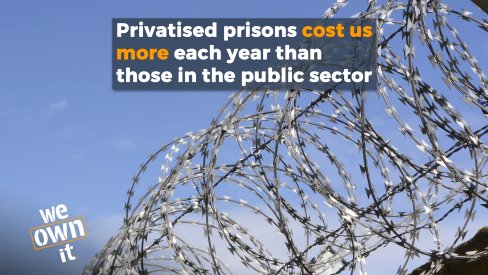
25 August 2018
This week’s news that Birmingham Prison is being taken over by the Government, after private firm G4S’s disastrous management of the prison, has rightly resulted in scrutiny of G4S’s operations. Inspections of HMP Birmingham revealed cockroaches, blood and vomit on the floor, and a strong smell of drugs across the prison.
But this is more than an outrageous one off.
The problems at Birmingham Prison are yet another example of the failure of prison privatisation. Allowing private companies to cut costs to increase profit is a bad idea when human lives are damaged by cost-cutting - and privatisation rarely produces the innovation that’s been promised. And the UK has the most privatised prison system in Europe.
No one should profit from putting people into cages. It’s time for all of us to get more involved in ending prison privatisation. These are five reasons to get involved today - five reasons #privateprisonfails:
1) G4S is a repeat offender when it comes to failed prison privatisations
G4S has been involved in prison scandal after scandal, in the UK and abroad. This was not even the first failure at Birmingham: there was a riot in HMP Birmingham in 2016. Last year, G4S had to pay a record £2.8m of fines for breaching its contract with the Ministry of Justice.
At the same time, G4S has made immense profits from its removal centres, with profit margins ranging from 20%-40%, well above the 6.8% limit set by the Home Office. This has happened while evidence has emerged of disturbing abuse of detainees at their detention centres. In another G4S youth prison, children suffered racist and degrading abuse from prison staff who were high on drugs.
G4S must not be allowed to manage prisons and detention centres. It has a shameful record of inhumane treatment, incompetent management, and sky-high profits.
2) Putting prisons and profit together is dangerous
When private prison companies minimise costs to make a profit, that cost-cutting puts the safety of guards and inmates at risk. Prisons in the UK are already dangerously overcrowded. They are not the place to play games with profit.
In other countries where prison privatisation has happened, there’s also been a loss of control. In 2016, Sodexo’s Forest Bank prison erupted in drug-fuelled violence, leading to an overdose death. Violence at a Doncaster prison run by Serco was found to be four times higher than in similar sized prisons across the UK.
This chaos can’t continue. Defenders of private prison companies say they are incentivised to maintain standards because otherwise they wouldn’t keep their contracts. But contracts are not always good tools of accountability. And these contracts haven’t stopped drug-fuelled violence in Forest Bank, constant violence at Doncaster, and riots at Birmingham.
3) Private prison companies have incentives to lock more people up
The prison population in the United Kingdom has more than doubled since Margaret Thatcher was Prime Minister. But this growth has not been matched with funding for mental health, education, and rehabilitation programmes. Inmates leave prison with the same problems they had going in, which doesn’t make our communities any safer.
Private prison companies don’t have much of an incentive to increase mental health or education services. In fact, it’s in their interests to keep a large number of people locked up: a high prison population keeps them in business.
The Corrections Corporation of America, the largest owner of private prisons in the United States, confirmed this, saying in 2016 that higher crime rates and harsher sentencing is good for their bottom line:
"Our growth is generally dependent upon our ability to obtain new contracts … . This possible growth depends on a number of factors we cannot control, including crime rates and sentencing patterns in various jurisdictions and acceptance of privatization.”
4) We as the public pay for the failures of prison privatisation
Prison privatisation is marketed as a way for government to save money. But privatisation often creates more unnecessary costs for the public.
In 2013, the National Audit Office found that Serco and G4S had fraudulently claimed payments from the public for electronic tagging of offenders. Serco and G4S agreed to pay the government back only after bad press and government pressure.
After £2 million worth of damage caused in the HMP Birmingham riot, the government has taken over control of the prison. At the end of the day, we all have to foot the bill of privatisation. And the benefits are not worth that hefty bill.
5) There is no market for prisons
Privatisation is supposed to provide choice and efficiency through competition. But prisons are close to a natural monopoly. There are just 3 multinational companies that manage 14 private prisons in the UK: Serco, G4S, and Sodexo.
Dr Simon Bastow describes this Big Three as being part of an “oligopolistic market”. They act together for their own common interest: profit.
Prison privatisation is a failed experiment. Instead of agreeing to contracts for prisons that have to be brought back into public management, we should commit to ending prison privatisation for good. Public prisons provide the best shot at delivering decent treatment of guards and inmates, and a justice system that works for all of us.





Comments
Diane Ward replied on Permalink
It makes no odds whether it's private or public they are equally disgraceful. The whole system is in crisis and poor management on both sides have driven out good experienced staff along with the dramatic cuts that weren't sustainable and the problems have been hidden by the MOJ for years.
Justin Wyllie replied on Permalink
There is another factor here.
If the idea of prisons is - at least in part - rehabilitation then who is based qualified to do this? Someone who works for the public sector, who has embraced a public sector ethos, who (basically) believes in society - or someone who works for a private company, who is controlled by a purely financial regime of bonuses / fear of loss of job?
That is - imprisoning people is/was in theory at least something to do with rehabilitation on behalf of society. A private company which exists only to increase its own profits simply can't do this - at best it can set a role model for selfish, financially motivated behaviour. (Ironically, in many cases it will have been selfish financially motivated behaviour which got people into trouble in the first place).
ALFRED JOHN SMITH replied on Permalink
I believe it's morally wrong to make a profit out of somebody else is suffering.
And as a country we should be copying the Scandinavian system there's work re offending in Norway Sweden and Finland has dropped dramatically
Add new comment